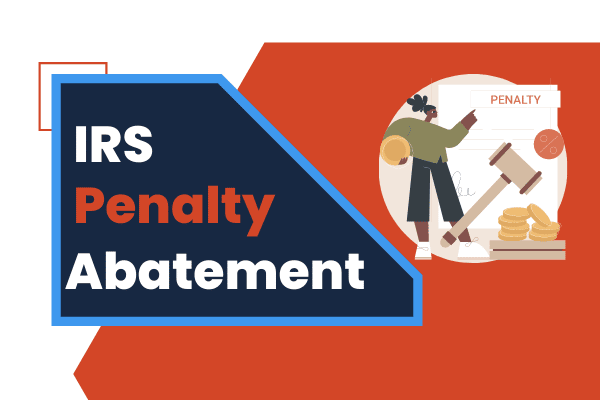Completely erasing IRS tax penalties may sound too good to be true, but IRS penalty abatement is an option for those who qualify!
Individuals and businesses can apply to have their failure to file, failure to pay, or failure to deposit penalties abated if specific criteria are met.
Here are some circumstances the IRS deems worthy of penalty abatement.
IRS Penalty Abatement: First Time Penalty Abatement
The tax deadline has passed, and you cannot file or pay your annual taxes. This is where the panic kicks in for most taxpayers, but you aren’t like most taxpayers. You’re now aware that there’s a possibility to be relieved of those penalties through IRS penalty abatement.
Paying back taxes with penalties added on top can be a lot, especially when the penalties seem unfair. The IRS introduced the first time penalty abatement waiver for taxpayers who normally (and consistently) file and pay on time.
How to Qualify for First Time Penalty Abatement
In order to qualify for first-time penalty abatement, these 3 criteria must be met:
- You cannot have incurred any penalties within the past 3 years
- Any taxes due have been paid in full or arranged to be paid
- You have filed all prior tax returns and extensions on time
It’s important to note that the first time penalty abatement only applies to one tax period, and it doesn’t relieve any accuracy-related penalties.
How to Apply for IRS First Time Penalty Abatement
If you meet the criteria laid out by the IRS, you can begin the application process for first time penalty abatement through the mail, over the phone, or electronically.
Your penalty abatement request should include all relevant information, such as:
- Tax year for which you received the penalty
- Type of penalty you received
- Penalty amount
- Your Tax Identification Number (TIN)
With this information, the IRS can look up your prior tax history and determine whether you qualify for first time penalty abatement.
Some penalties can be instantly removed if you qualify, but some penalties will not be removed until the tax owed has been paid in full.
Don’t be discouraged if the IRS rejects your first application. This happens when all the details are unclear.
If your request is rejected, we highly recommend working with an experienced tax lawyer to help you request an appeal and have your penalties removed.
Reasonable Cause Penalty Abatement
Contrary to popular belief, the IRS does understand that life happens, and sometimes it’s out of our control. Some penalties can be removed through reasonable cause penalty abatement.
“Reasonable cause” refers to the evidence that a taxpayer acted “in good faith” or the negligence was not due to willful neglect. Honesty goes a long way with the IRS!
Here are some situations that can qualify for reasonable cause penalty abatement:
- Death of a close family member
- Long-term illness
- The taxpayer was in prison or rehab
- A natural disaster destroyed tax records
- The taxpayer misunderstood tax laws
- The taxpayer received incorrect information from a tax professional
You should be prepared to provide any evidence supporting your application for reasonable cause penalty abatement. Simply forgetting to file or making a mistake on your tax return may not qualify for this type of penalty abatement.
Not sure what type of evidence you need? Our experienced tax attorneys can help!
Statutory Exception
So, you received some advice from the IRS, followed each step, but were still assessed an IRS tax penalty.
While this situation is not ideal, it does happen. If you received incorrect written advice from the IRS, you can file for statutory exception penalty abatement.
Here’s what you’ll need in order to request statutory exception penalty abatement:
- A copy of your written request for advice
- The written advice you received and relied upon from the IRS
- Your tax return displaying the penalties assessed due toyour reliance on the advice received from the IRS
- Notice from the IRS indicating an increase in tax and penalties owed that corresponds with the portion of the tax return where IRS advice was utilized.
Individuals can generally use IRS Form 843 to request this type of IRS penalty abatement. This form can only be submitted by individual taxpayers and not businesses.
Find Help with Penalty Relief
The IRS provides taxpayers with different options to abate tax penalties, but it’s important to understand which type of penalty relief suits you.
Contact Gordon Law Group today and allow our award-winning team of tax lawyers to help you apply for IRS penalty relief!




